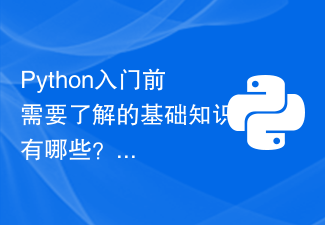
Necessary entry code for learning Python programming, specific code examples are required
Foreword:
Python is a very popular programming language that is widely used in Data analysis, machine learning, web development and other fields. For beginners, it is very important to understand some basic syntax and common codes of Python. This article will introduce some essential introductory codes for Python programming and provide specific code examples to help beginners get started quickly.
- Variables and data types
In Python, we can use variables to store data and specify the type of data. The following are some common data types and their code examples:
a. Integer (int):
x = 5 print(x)
b. Floating point number (float):
y = 3.14 print(y)
c. String:
name = "Alice" print(name)
- Input and output
Python provides simple and powerful input and output functions. Here are some common input and output code examples:
a. Output (print):
x = 5
y = 3.14
name = "Alice"
print("x =", x)
print("y =", y)
print("My name is", name)b. Input (input):
name = input("请输入你的名字:")
print("你好,", name)- Conditional judgment
In programs, we often need to perform different operations based on conditions. Python provides the conditional judgment statement if-else to implement this function. The following is a code example of conditional judgment:
x = 10
if x > 5:
print("x大于5")
else:
print("x小于等于5")- Loop
Loop is a mechanism to repeatedly execute a certain piece of code. Python provides two loop statements: for loop and while cycle. The following are code examples of two types of loops:
a. for loop:
for i in range(5):
print(i)b. while loop:
x = 0
while x < 5:
print(x)
x += 1- function
function It is a reusable block of code that accepts input parameters and returns output results. The following is a code example of a function:
def add(x, y):
return x + y
result = add(3, 4)
print(result)- Lists and Dictionaries
Lists and dictionaries are commonly used data structures in Python and can be used to store multiple data. The following are code examples for lists and dictionaries:
a. Lists:
numbers = [1, 2, 3, 4, 5] print(numbers[0]) print(numbers[2:4])
b. Dictionaries:
student = {"name": "Alice", "age": 18, "gender": "female"}
print(student["name"])
print(student["age"])Conclusion:
This article is an introduction to Python programming Some essential introductory code and provides specific code examples. By learning these codes, beginners can quickly understand the basic syntax and common functions of Python, laying a solid foundation for further in-depth learning. I hope this article will be helpful to beginners, and also encourage everyone to bravely try programming and enjoy the fun of programming!
The above is the detailed content of Essential Starter Code: Learn Python Programming. For more information, please follow other related articles on the PHP Chinese website!
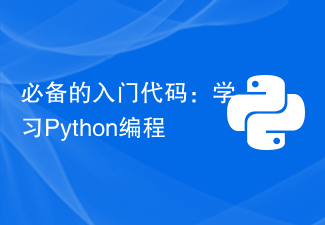 必备的入门代码:学习Python编程Jan 04, 2024 pm 09:22 PM
必备的入门代码:学习Python编程Jan 04, 2024 pm 09:22 PM学习Python编程的必备入门代码,需要具体代码示例前言:Python是一种非常流行的编程语言,被广泛应用于数据分析、机器学习、Web开发等领域。对于初学者来说,了解一些Python的基本语法和常用代码是非常重要的。本文将介绍一些Python编程的必备入门代码,并提供具体的代码示例,帮助初学者快速上手。变量和数据类型在Python中,我们可以使用变量存储数据
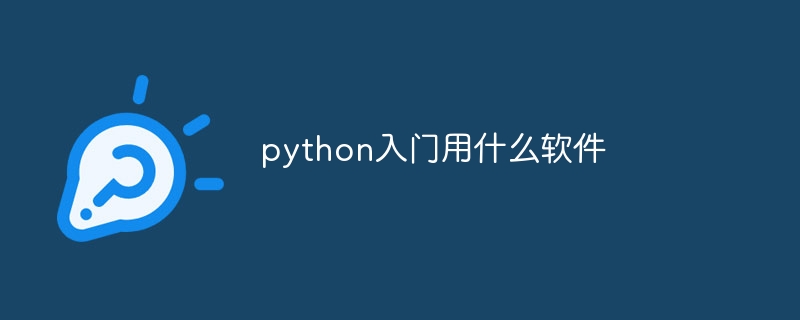 python入门用什么软件Oct 25, 2023 am 10:34 AM
python入门用什么软件Oct 25, 2023 am 10:34 AM对于Python初学者来说,推荐使用集成开发环境(IDE)或交互式编程环境(如JupyterNotebook)进行编程。这些开发软件可以提供更好的代码编辑和运行体验,帮助您更轻松地学习和掌握Python编程。在选择开发软件时,请根据自己的需求和喜好进行选择,以便更好地学习和掌握Python编程。
 需要具备哪些基本技能,才能准备学习Python?Jan 13, 2024 am 09:46 AM
需要具备哪些基本技能,才能准备学习Python?Jan 13, 2024 am 09:46 AM准备学习Python,你需要具备哪些基本技能?Python作为一门简洁易学的编程语言,受到越来越多人的喜爱和使用。许多初学者都希望通过学习Python来开发自己的程序和项目,但在开始学习之前,有几个基本的技能是必备的。本文将介绍学习Python所需的基本技能,并提供相应的代码示例供参考。编程基础在学习Python之前,最好具备一定的编程基础。了解常见的编程概
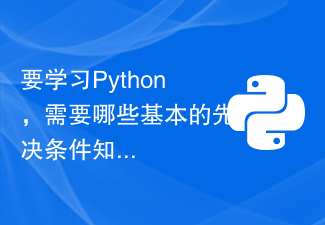 要学习Python,需要哪些基本的先决条件知识?Jan 13, 2024 pm 02:40 PM
要学习Python,需要哪些基本的先决条件知识?Jan 13, 2024 pm 02:40 PM想要学习Python,你需要具备哪些基本的前置知识?Python作为一门易学易用的编程语言,非常适合初学者入门。然而,在开始学习Python之前,一些基本的前置知识会对学习过程产生积极的影响。本文将详细介绍学习Python所需的基本前置知识,并提供一些具体的代码示例。1.编程基础知识在学习Python之前,了解一些基本的编程概念和术语会非常有帮助。你需要了解
 C语言编程基础:从基本单位开始Mar 18, 2024 pm 09:39 PM
C语言编程基础:从基本单位开始Mar 18, 2024 pm 09:39 PMC语言编程基础:从基本单位开始C语言作为一种被广泛应用的编程语言,是许多程序员入门学习的首选。作为一种中级编程语言,它具有良好的可移植性、效率和功能丰富性,因此深受程序员们的喜爱。本文将从C语言的基本单位开始介绍其编程基础,包括数据类型、变量、常量、运算符等,同时配以具体的代码示例,帮助读者更好地理解和掌握C语言的基础知识。1.数据类型在C语言中,数据类型
 Python 语法的魔法配方:精通代码基础Feb 21, 2024 am 08:39 AM
Python 语法的魔法配方:精通代码基础Feb 21, 2024 am 08:39 AM变量与数据类型变量用于存储数据,其名称必须遵循python的命名规则。Python支持多种数据类型,包括数字、字符串、列表和元组。声明变量时,使用赋值运算符(=)将其与值关联。#声明一个整数变量age=25#声明一个字符串变量name="JohnSmith"流程控制Python使用条件语句(if-else)和循环语句(for、while)来控制程序流程。条件语句根据条件执行不同的代码块,而循环语句重复执行特定代码块,直到满足退出条件。#if-else语句ifage>=18:print("成年人"
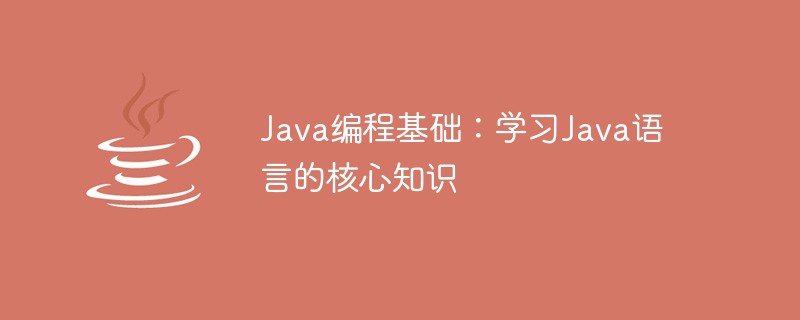 Java编程基础:学习Java语言的核心知识May 11, 2023 pm 07:52 PM
Java编程基础:学习Java语言的核心知识May 11, 2023 pm 07:52 PMJava编程基础:学习Java语言的核心知识Java是一种面向对象的编程语言,它已经成为很多公司编写Web应用和服务的重要工具之一。为了掌握Java编程,你需要掌握它的核心概念和语法,这些都包含在基础知识中。在本文中,我们将介绍Java编程的核心知识。数据类型在Java中,数据类型用于定义变量,控制变量的内存大小和表示范围。Java中有8种基本数据类型,分为


Hot AI Tools

Undresser.AI Undress
AI-powered app for creating realistic nude photos

AI Clothes Remover
Online AI tool for removing clothes from photos.

Undress AI Tool
Undress images for free

Clothoff.io
AI clothes remover

AI Hentai Generator
Generate AI Hentai for free.

Hot Article

Hot Tools

SublimeText3 Mac version
God-level code editing software (SublimeText3)

SublimeText3 Linux new version
SublimeText3 Linux latest version

SecLists
SecLists is the ultimate security tester's companion. It is a collection of various types of lists that are frequently used during security assessments, all in one place. SecLists helps make security testing more efficient and productive by conveniently providing all the lists a security tester might need. List types include usernames, passwords, URLs, fuzzing payloads, sensitive data patterns, web shells, and more. The tester can simply pull this repository onto a new test machine and he will have access to every type of list he needs.

WebStorm Mac version
Useful JavaScript development tools

SublimeText3 English version
Recommended: Win version, supports code prompts!





